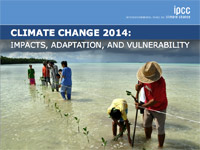
| IPCC 5th Assessment Report Confirming Climate Science | 11 April 14 |

Climate Change 2014:Impacts, Adaptation, and Vulnerability, made special mention of Canada's role in the face of climate change. Observed changes to climate are attributed to human-induced causes with very high confidence. An example is the decreased snowmelt runoff in the mountains in North America. WGII's report also discusses the effects of climate change on the boreal forest fire regime, with ecosystems experiencing increased vulnerability from extreme wildfire activity and regional drought. The report continuously states with high to very high confidence, (95% confidence) that climate change is worsening and caused by human-induced activity. The third report of the Fifth Assessment deals with the mitigation of climate change, setting the technological, economic and institutional requirements that governments will have to incorporate on micro and macro scales in order to mitigate negative effects of climate change. The report is still undergoing completion, but a leak of WGIII's report reached the Guardian news agency, and apprehension towards the IPCC proposed mitigation measures is already surfacing among ecologists. A British environmental organization, Biofuelwatch, states that the third report's strong recommendation of untested and unreliable technologies such as bioenergy with carbon capture and sequestration (BECCS) is very worrisome. BECCS technology is not only risky, but has the potential to intensify climate change's negative effects identified in the first two IPCC Fifth Assessment reports such as erosion, water scarcity and agricultural problems.
View April 7, 2014 The Guardian article Sources:
The Guardian, IPCC
|
|
 Print version Print version |
Top |
